Eye health is important, but how do you tell facts from fiction? What are the most important things to really know about keeping your vision healthy? Here are some common vision health misconceptions.
- Eating carrots will improve your eyesight: Vitamin A is essential for good vision, and while carrots are high in Vitamin A, you don’t need a carrot based diet or extra carrots to help keep your eyes healthy. Vitamin A is also found in other foods, like milk, cheese, eggs, and more, so extra carrots won’t help your vision if you’re eating a well balanced diet that already has enough vitamin A.
- Reading in dim light or darker rooms can damage your vision: While reading in darker spaces without much light can cause eye fatigue or even headaches, it’s unlikely to cause damage to your overall vision or weaken your eyes.
- Computer screens can damage your eyes: Staring at screens can lead to eyestrain, tired eyes, or dry eyes if you’re not taking regular screen breaks. Experts recommend resting your eyes by changing your vision focus to something else every 20 minutes. The blue light that screens emit, however, can be disruptive to sleep and energy, so it’s important to minimize screen time before bed or use blue-light reducing eye glasses to help you sleep better and reduce fatigue so you can perform better at work and school.
What “eye health” means will really vary person to person. People who need vision correcting glasses, for instance, won’t damage their eyes by not using their glasses, but it may make life more uncomfortable and difficult. People with diabetes, however, will need to maintain proper overall health and follow their doctor’s instructions to avoid vision-related complications.
The most important part of eye health? Regular eye exams from your eye doctor who can keep track of your eye health and work with you to make a plan to keep your vision healthy and your eyes happy.
Find BluTech Near You




